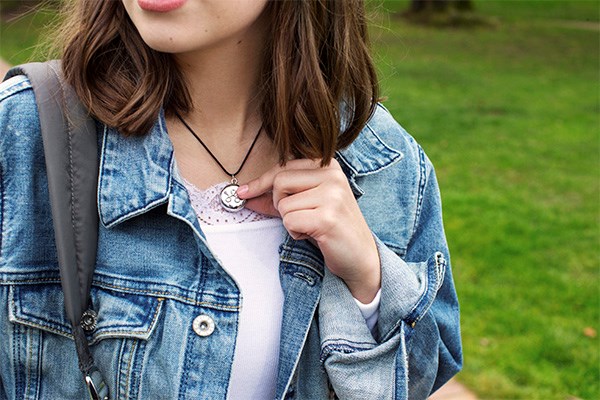DifferenceMaker Smart Jewelry Project Launches Soon
 Image by courtesy photo
Image by courtesy photo
04/05/2018
By David Perry
When she graduated in 2016, Rajia Abdelaziz had some promising options ahead of her.
The electrical engineering/computer science alum was being wooed by some big names. She turned down a six-figure salary offer from Google.
She decided instead to follow through with invisaWear, the smart necklaces, bracelets and keychains designed to keep women safe by sending alerts via text to love ones and even police when activated. Simple and elegant, the 14-karat-gold encased or silver-plated jewelry is loaded with technology to alert friends, police and family if there’s a problem.
Here’s how it works: After purchasing the jewelry, the buyer downloads a free app to their phone. Pairing the device to Bluetooth allows one to preselect up to five emergency contacts. If the wearer needs assistance, they click firmly on the back of the piece – twice – to alert contacts through text. They are also notified of the person’s exact location, as will a 911 dispatcher.
Abdelaziz and business partner, Raymond Hamilton ’17 (electrical engineering), had developed and refined the product enough to take home thousands in prize money from UMass Lowell Difference Maker competitions.
Since then, the company has officially launched, been touted by the press (“How this didn’t exist until now completely baffles me,” noted Popsugar) and funded faster than anyone expected. Their first round of funding -- $500,000 – allowed them to cover the cost of product development, hire a team and get to market.
InvisaWear is available for pre-order now at a 30 percent discount (off the normal price of $129) by going to: www.invisaWear.com.
“We're going to be selling starting July on our website and on Amazon,” says Abdelaziz. “In the future we have plans to sell in retails stores and in campus book stores.”
 Image by courtesy photo
Image by courtesy photo
When they launched a 30-day IndieGogo crowd funding campaign in February, they met their $20,000 goal in a week. When it was over, they’d raised $36,432, or 182 percent of their goal.
“We are honored to have started this journey at the university, said Abdelaziz recently, sitting in InvisaWear’s offices. “UMass Lowell is so supportive of us.”
“It was when we won Innovative Technology Solution (and $4,500) at the 2016 Idea Challenge, we thought, hmm, maybe we are onto something here,” adds Hamilton.
Steve Tello, vice provost for Innovation and Workforce Development, has cited Abdalaziz as one of the outstanding “female leads” of DifferenceMaker projects.
Abdelaziz, who is from Nashua, met Hamilton early on in an engineering class. As a woman, she says she was in the minority in her classes.
“I was shy and timid,” she says.
But she hit it off with Hamilton. They partnered in labs, and often skipped social events to work weekends, “re-doing some of our projects for fun.”
“And here we are, five years later,” she says, “starting a company.”
Abdelaziz served as chapter president of UML’s Society of Women Engineers. Meetings, held on campus in the evenings, became more and more poorly attended. She wondered why. It turns out, some women were uncomfortable walking alone at night.
She carried pepper spray and suggested they do as well.
“Everyone looked at me like I had four heads,” she recalls.
And what if the attacker grabs it from me, came the answer. When soon after a man sitting next to her casually picked up the pepper spray on her key chain “to see if it worked,” she realized they were right.
Abdelaziz and Hamilton began working on InvisaWear as a capstone project. When they heard of the DifferenceMaker program, they entered.
Now, with production underway, Abdelaziz says the company will focus on marketing and increasing sales, building strategic partnership with universities and ramping up media exposure.
“We never imagined the level of success we’d be able to achieve in such a short time period,” says Abdelaziz. Without UMass Lowell’s “help and support, we would have never been able to achieve this level of success.”




